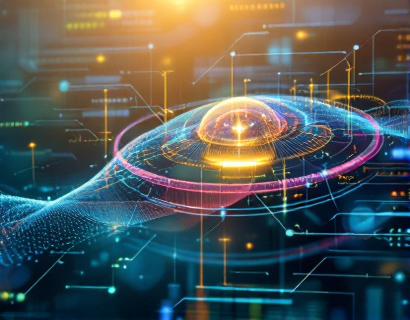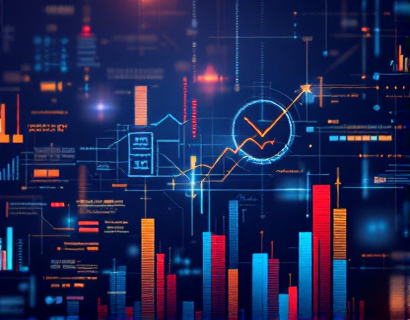AI and Crypto: Transforming User Experiences in the Digital Age
The intersection of artificial intelligence and cryptocurrency is revolutionizing the digital landscape, offering unprecedented opportunities for innovation and enhanced user experiences. This fusion of technologies is not just a trend but a fundamental shift in how we interact with digital platforms and services. As tech enthusiasts and innovators, understanding the synergy between AI and crypto is crucial for navigating the future of connected technologies.
The integration of AI into the crypto space has led to the development of smarter, more efficient, and user-friendly applications. AI algorithms can analyze vast amounts of data to predict market trends, optimize trading strategies, and enhance security measures. This article delves into the transformative impact of this merger, exploring how it is redefining digital experiences and app interactions.
Enhanced Security Through AI
One of the most significant benefits of combining AI with cryptocurrency is the enhancement of security protocols. Traditional cryptographic methods, while robust, are increasingly being challenged by sophisticated cyber threats. AI-driven security solutions can detect and respond to anomalies in real-time, providing a dynamic layer of protection against potential breaches.
Machine learning models can analyze patterns in transaction data to identify suspicious activities, such as unusual withdrawal patterns or unauthorized access attempts. These systems can adapt and learn from new threats, continuously improving their ability to safeguard user assets. This proactive approach to security not only reassures users but also fosters greater trust in crypto platforms.
Personalized User Experiences
AI's ability to process and interpret vast datasets makes it an ideal tool for creating personalized user experiences. In the crypto space, this means tailored recommendations, customized portfolio management, and intuitive user interfaces. AI algorithms can analyze user behavior, preferences, and market data to provide insights and suggestions that are relevant and actionable.
For instance, a crypto trading platform powered by AI can offer personalized portfolio recommendations based on an individual's risk tolerance, investment goals, and historical trading patterns. This level of customization enhances user engagement and satisfaction, making the platform more appealing and effective.
Smart Contracts and AI Optimization
Smart contracts, self-executing contracts with the terms directly written into code, are a cornerstone of blockchain technology. When combined with AI, these contracts can become even more sophisticated and efficient. AI can optimize the execution of smart contracts by analyzing real-time data and adjusting parameters to achieve optimal outcomes.
For example, in decentralized finance (DeFi) applications, AI can dynamically adjust interest rates, liquidity provision, and other contract parameters based on market conditions. This adaptability ensures that smart contracts operate at peak efficiency, reducing costs and increasing the reliability of transactions.
Predictive Analytics for Market Insights
Predictive analytics is another area where AI and crypto intersect to provide valuable insights. By leveraging machine learning algorithms, it is possible to forecast market trends with greater accuracy. These predictions can help investors make informed decisions, potentially leading to higher returns and reduced risk.
AI models can analyze historical data, current market conditions, and even sentiment analysis from social media and news sources to generate comprehensive market reports. This holistic approach to market analysis empowers users to navigate the complexities of the crypto market with confidence.
Improved User Interface and Experience
The user interface (UI) and user experience (UX) of crypto applications are critical factors in user adoption and retention. AI can play a pivotal role in designing intuitive and user-friendly interfaces. By understanding user behavior and preferences, AI can optimize the layout, navigation, and functionality of crypto apps.
For instance, AI-driven UX design can conduct A/B testing to determine the most effective interface elements, ensuring that users can easily access and utilize the features they need. This data-driven approach to UI/UX design results in a more seamless and enjoyable user experience, encouraging longer engagement and higher satisfaction.
Enhanced Customer Support Through Chatbots
Customer support is an essential component of any digital platform, and AI-powered chatbots are transforming the way support is delivered in the crypto space. These chatbots can provide instant, 24/7 assistance, answering common questions, guiding users through complex processes, and resolving issues efficiently.
Natural language processing (NLP) enables chatbots to understand and respond to user queries in a natural, conversational manner. This not only improves the efficiency of customer support but also enhances the overall user experience by providing timely and accurate assistance.
Decentralized AI Models
The future of AI in the crypto space also involves the development of decentralized AI models. These models leverage blockchain technology to ensure data privacy, transparency, and decentralization. By distributing AI computations across a network of nodes, decentralized AI can reduce the risk of data breaches and central points of failure.
This approach aligns with the core principles of blockchain, promoting a more secure and trustworthy environment for AI applications. Decentralized AI models can be particularly beneficial for sensitive applications, such as identity verification and financial transactions, where data privacy is paramount.
Challenges and Considerations
While the integration of AI and crypto offers numerous benefits, it also presents challenges that must be addressed. One of the primary concerns is the computational power required for AI algorithms, which can be resource-intensive and costly. Additionally, the regulatory landscape for crypto is still evolving, and the use of AI in this space may face scrutiny and oversight.
Another consideration is the potential for bias in AI models, which can lead to unfair or inaccurate outcomes. Ensuring that AI systems are trained on diverse and representative datasets is crucial to mitigating these risks. Transparency in AI decision-making processes is also essential for building trust among users.
Conclusion
The convergence of AI and cryptocurrency is ushering in a new era of digital innovation, offering transformative benefits for users and developers alike. From enhanced security and personalized experiences to optimized smart contracts and predictive analytics, the potential applications are vast and varied. As this field continues to evolve, staying informed and adaptable will be key to harnessing the full potential of AI and crypto.
The future of connected technologies is bright, with AI and crypto at the forefront of this exciting journey. By embracing these advancements, we can create more secure, efficient, and user-centric digital experiences that redefine the way we interact with the world around us.











































